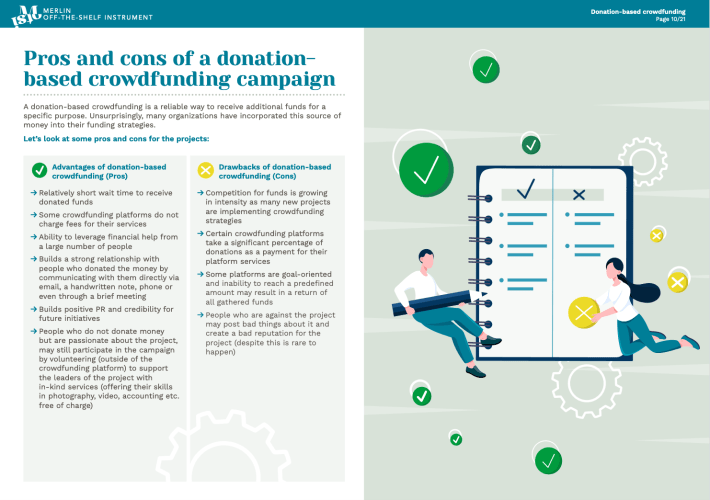MERLIN Off-the-Shelf Instruments help access new funding for environmental restoration

It is well documented that Europe’s ecosystems are in urgent need of protection and restoration. However, as the debates over the EU Nature Restoration Law have shown, getting ambitious nature recovery projects off the ground is not always straightforward.
A common problem is that whilst there may be public and political support for environmental projects, there is often a critical lack of financing to make them happen in practice. The EU MERLIN project has recently released new tools to help environmentalists access funding sources to help make their projects a reality.
Working with the consultancy firm CONNECTOLOGY researchers from MERLIN have published two ‘Off-the-Shelf Instruments’ which demonstrate the potential of donation-based crowdfunding and corporate donations to help finance environmental projects.
The idea behind these Instruments is that the urgency of the biodiversity crisis and climate emergency, coupled with the slow pace of political processes, requires us to look more broadly at new forms of funding to help bring degraded ecosystems back to life. The authors suggest that, “these instruments not only facilitate public funding but also acknowledge the indispensable role of private finance in propelling impactful initiatives forward.”
The two Off-the-Shelf Instruments released this week are the first of a series exploring new forms of environmental funding. Each Instrument includes an overview of the pros and cons of the funding source, alongside best practice guides, case studies, timelines and suggested Key Performance indicators (KPIs) for implementing them.
You can keep up with the release of new Off-the-Shelf Instruments on the MERLIN website.

Donation-based crowdfunding
Crowdfunding has emerged has emerged as a key mode of gaining financial support for charitable and environmental projects in recent years. Supported by the rapid growth in mobile technologies, crowdfunding involves backers (or donors) providing financial support to help make projects happen.
Donation-based crowdfunding means that this financial support is offered by backers without the expectation of anything in return. Money is instead offered towards supporting projects – such as river restoration – which a backer sees as worthwhile.
The MERLIN researchers suggest that such donation-based crowdfunding can not only help attract financial support for environmental projects, but its ability to ‘travel’ online through social media means there is the potential for wide new audiences to be engaged in the issues it seeks to address.
The researchers outline the need to create a strong and compelling story over why crowdfunding is needed, and how the funds are going to be spent. They highlight how this approach requires skilful communications across blog posts, social media and FAQs to keep backers updated with project progress, milestones and outcomes.
The team highlight a case study of donation-based crowdfunding on Rothley Weir in Leicestershire, UK. A campaign by The Rivers Trust was launched on the WWF’s Crowdfunding website in July 2021 seeking support to help remove a redundant dam which was harming the health of the river’s ecosystem. Within three months, the campaign had received over €12,000 in donations, and by September 2021 the dam had been removed.
You can read the full guide to donation-based crowdfunding for environmental projects here.

Corporate donations
Companies, foundations, and other private organisations often make financial donations to support social causes, environmental projects and community schemes. These donations are often framed as a means of a company voluntarily managing or mitigating its impacts on society and the environment.
These donations are not always financial; instead ‘in-kind’ donations of machinery, expertise, materials or volunteer workforces can be useful to environmental organisations in need of support. Whether financial or in-kind, such donations are valuable as they don’t require organisations to provide a financial return to their donors.
The MERLIN researchers identify three main forms of corporate philanthropy: corporate giving programmes; company-sponsored foundations; and ad-hoc requests from organisations. Matching gifts is a common form of corporate giving programmes, where an organisation will financially multiply donations made from their employees.
Corporate donations can potentially offer environmental organisations free funding and assistance for their projects, and raise awareness of their causes. However, it is important to note that corporations are profit-making entities, and the reputation, activities and corporate interests of donor organisations, and their reasons for donating, should be closely scrutinised.
The team highlight a range of successful examples of corporate donations supporting environmental projects across Europe. For example, a €10 million donation from Volkswagen AG in 2018 facilitated repairs to storm damage on the Ebro Delta in Spain, supported UNESCO Biosphere Reserves in Spain, Poland and Germany, and helped restore the Barnbruch woodland in Germany.
You can read the full guide to corporate donations for environmental projects here.
///
This article is supported by the MERLIN project.















Comments are closed.